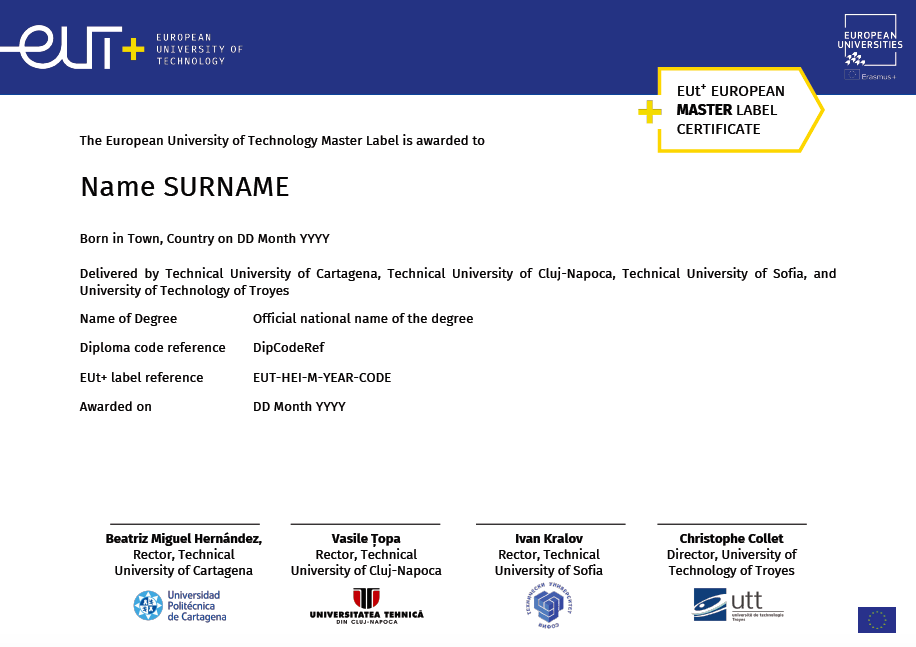In the same section
- Home
- EUT+ initiative
- Joint European Degree Label in engineering (JEDI)
Joint European Degree Label in engineering (JEDI)

This project aims to explore and revise criteria for the implementation of a harmonised European label for joint degree programmes. With a one-year duration and from an engineering, technological, and scientific educational perspective, this project coordinated by the Universidad Politécnica de Madrid (UPM) is committed to providing an additional label to the academic degrees obtained by the students.
In close collaboration with various stakeholders (accreditation agencies, ministries, employers, alumni, student representatives…), the project will analyse the feasibility and impact of the label at the institutional level and define various innovative learning methodologies, emphasizing the European values integrated into joint programmes.
JEDI is part of the collaboration among three European universities, EELISA, ENHANCE, and EUt+. All three alliances are aware of the opportunities and challenges that European partnerships with joint programs and other innovative recognition systems offer for transnational learning experiences.
Towards a joint European degree – The EUt+ Certificate
The members of EUt+ have affirmed their ambition to build a single European university based on the full integration of their nine institutions, creating a new higher education ecosystem. Student experience being an essential feature of this new European university, a strong focus is put on the development of clusters, that is to say groups of curricula, in a given thematic, from different member institutions which aims at an accelerated convergence to become, as soon as possible, a joint European degree with a single academic regulation, where the student can move freely across several EUt+ campuses.
Mobility in EUt+ curricula
Mobility is embedded in any EUt+ curricula,
"In order to build themselves and their vision of Europe, our students need to experience an in-depth exposure and immersion. This can only be achieved through long and transforming mobility. Mobility is not an end in itself, but a necessity to be exposed to others and their cultures, and to discover oneself. Mobility is therefore a way of being more than an operation of geographical movement. For the EUt+ European degrees, students are guided towards this state of mind which leads them to meet other cultures in the long term,”
(Extracted from article 2.1 of the European Degree in Engineering EUt+ reference guide, appendix to the Memorandum of Agreement for the Creation of EUt+ Bachelor in Engineering and Master in Engineering Programmes, by Evolution and Convergence of Existing Partner Programme, signed on 24.09.2021)
EUt+ Certificate
In anticipation of the European Label and later the Joint European Degree proposed by the European Commission, an EUt+ certificate attached to the national diploma will be offered to EUt+ students according to the following conditions:
- In the framework of their studies, the student must prove engaging into a physical mobility of 12 weeks within EUt+,
- The achievement of the following level in foreign languages (using the CEFR frame) is to be assessed:
- one foreign European language at level B2 for bachelor;
- a second foreign European language at level B1,
- Immersion in the national language and culture of the destination (preferably with 5 ECTS in the Learning Agreement and assessed at least A1 level)
- A minimum of 25 ECTS are to be obtained during the physical mobility at an EUt+ member campus,
- The national conditions for validation of the bachelor or master degree are fulfilled.
The student is automatically awarded this EUt+ certificate without having to request it. The mobility does not necessarily have to be done within a cluster.



